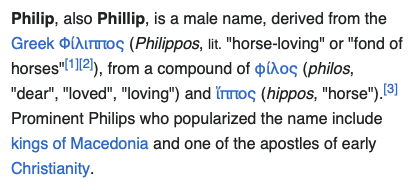Welcome back to 100 lies The God Culture teaches about the Philippines. Today's lie concerns the etymology of the word Philippines. Timothy Jay Schwab claims the word is actually two Hebrew words.
He makes this claim in the following video.
 |
|
Tim also makes the same claim in his book The Search for King Solomon's Treasure.
However, as we progress into profundity, Mindoro befits concisely the national local name for the Philippines in tracing “Pilipinas” or “Pilipina.” However, that word ties to this entire narrative in the most bizarre way when one assesses the Hebrew.
Pilipinas: Pilipina
Local Name for The PhilippinesHebrew: pili: פלאי: Wonderful, incomprehensible, secret, miraculous. Hebrew: pinnah: פנה: Cornerstone. [240-241]Our Interpretation: Miraculous CornerstoneThe Land of Creation is the miraculous cornerstone of all life on Earth. This word pinnah is the same word used in describing “He is our Chief Pinnah or Cornerstone” in Psalm 118:22. Pili means wonderful such as in “He shall be called pili, counselor, the mighty God...” from Isaiah 9:6-7. The Spanish named the Philippines after it’s King and it appears very wise Filipinos tricked them into allowing them to use a local name which originates in the Hebrew language. Many of our viewers have also pointed out that in Tagalog this bares a very similar meaning “Chosen Land” also very similar to the Hebrew definition and this is a pattern we observe often in the Philippines.
The Search for King Solomon's Treasure, pgs 186-187
At least Tim acknowledges the Spanish named the Philippines after King Philip II. It was Ruy Lopez de Villalobos who gave the Philippines its name. He tells us this in a relation of his journey in these islands.
RELATION OF THE JOURNEY MADE FROM NEW SPAIN AND THE WESTERN ISLANDS BY RUY GOMEZ DE VILLALOBOS, BY ORDER OF VIRET D. ANTONIO DE MENDOZA
pg. 117
He writes:
And the people gathered the galley and in Sarragan a ship sailed, and the others were in a condition to get closer; and when we arrived, a remedy was taken, and it was agreed to send a ship to New Spain. And because all the ships arrived so poorly equipped when they arrived, the smallest was sent, because we had nothing to do with the others. And because there were few provisions with which to go, it was agreed that the galley should go to some islands where it had sailed, which we call Felipinas, from the name of our blessed Prince, which they said were very well preserved, and there they should buy provisions: and so it was done. On August 1, 1543, the ship left Sarragan to go to New Spain and the galley to bring some provisions.
So, where does Tim get the idea
"wise Filipinos tricked them into allowing them to use a local name which originates in the Hebrew language?"
Are we really to believe that some "wise natives" discussed the naming of these islands with the Spanish explorers? It's total nonsense. Nobody tricked the Spanish into naming these islands after "our blessed Prince." Philippines is not two Hebrew words Pili and Pinnah meaning miraculous cornerstone. It's named after King Philip II and Philip means horse lover.
The notion that "wise Filipinos tricked" the Spanish into naming these islands the Philippines is totally absurd. It is simply one more lie about the Philippines taught by Timothy Jay Schwab who is The God Culture.








No comments:
Post a Comment